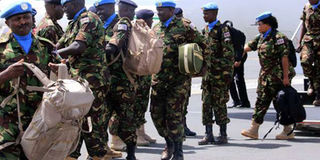UN’s action no way to honour Kenya’s role in Sudan’s peace

Kenya Defence Forces troops arrive at Jomo Kenyatta International Airport on November 9, 2016 following President Uhuru Kenyatta's directive recalling them from South Sudan. History shows that missions with adequate resources and attention are more often than not successful. PHOTO | JEFF ANGOTE | NATION MEDIA GROUP
What you need to know:
- Even more worrying for Kenya is that the action eviscerates the country’s contribution to peace and stability in Sudan.
- It had become apparent to many that the situation in South Sudan required more sustained political negotiation than military presence.
The dismissal of Lt-Gen Johnson Mogoa Kimani Ondieki as commander of the UN Mission in South Sudan comes off as a knee-jerk reaction that fails to address structural limitations of UN peacekeeping operations.
Even more worrying for Kenya is that the action eviscerates the country’s contribution to peace and stability in Sudan.
The reason given for the action was that the commander failed to protect civilians during violence in Juba last July.
He arrived in Juba on June 10, 2016, and officially took over on June 17.
The violence took place between July 8 and 12. The tragic attack on the Terrain Hotel happened on July 11.
The UN decided to dismiss an individual who had arrived at the workplace just three weeks earlier.
Kenya has taken part in peace keeping operations in more than 40 countries, sending out over 30,000 soldiers in the process.
However, its military involvement was not the first contribution to peace in Sudan.
It provided a logistics and operations hub for Operation Lifeline Sudan in 1989 following devastating famine and civil war between the then government of Sudan and the Sudan People’s Liberation Movement Army.
Kenya played a prominent role in the Comprehensive Peace Agreement that was signed in January 2005 by the Sudan People’s Liberation Movement and the government of Sudan to end the civil war.
The agreement also set a timetable for the referendum on the independence of South Sudan.
KENYA IN PAIN
Kenya’s General Lazaro Sumbeiywo led in mediating the negotiations.
The two processes were long-drawn and laden with disappointments, and Kenya bore the brunt of this.
That is why the decision to blame the country’s military leadership for the UN peacekeeping’s structural weakness did not go down well in Nairobi.
The government of Kenya has protested at the lack of formal consultations prior to the dismissing of Lt-Gen Ondieki, terming it a demonstration of disregard for Kenya’s key role in South Sudan.
What is more, one discerns a whiff of inconsistency.
In August last year, following multiple sex abuse allegations against peacekeeping troops in the Central African Republic, UN peacekeeping envoy Babacar Gaye was fired.
Inexplicably, in the South Sudan case, the axe fell on the new military commander.
It was also critical that the peace process in South Sudan be continually encouraged and any challenges that arise quickly addressed if justice was to become the cornerstone of the governance architecture in South Sudan.
It had become apparent to many that the situation in South Sudan required more sustained political negotiation than military presence.
A recent report by the UN Office of Internal Oversight Services acknowledges that operational and political constraints in missions were at odds with their legal authority and mandate to act and that some missions felt outnumbered and stretched, “making the use of force only a paper option”.
As is the case in many conflict areas, military action without commensurate political negotiations can only have limited impact.
REQUIREMENTS
Tough questions must then be asked, not only regarding the success rate of UN peacekeeping missions, but also how to deal with the centre when it is reluctant or too slow to respond to the needs of the field.
Perhaps we have not learnt from Srebrenica, Rwanda, and the Democratic Republic of Congo.
The Security Council should support regional efforts more actively by ensuring that the forces on the ground have the enablers and multipliers needed to ensure successful missions.
History shows that missions with adequate resources and attention are more often than not successful.
Unless the international community goes back to the drawing board, well-intentioned efforts by countries that contribute troops to UN peacekeeping missions will be unappreciated and innocent civilians will continue to suffer.
Member states will not want to participate in missions that appear to be set up to fail.
Firing one of our generals for the systemic weaknesses of UN peacekeeping and without prior consultation is not only disrespectful, it dishonours Kenya’s contribution to the peace effort in South Sudan.
Ms Mohamed is the Cabinet secretary for Foreign Affairs and International Trade




